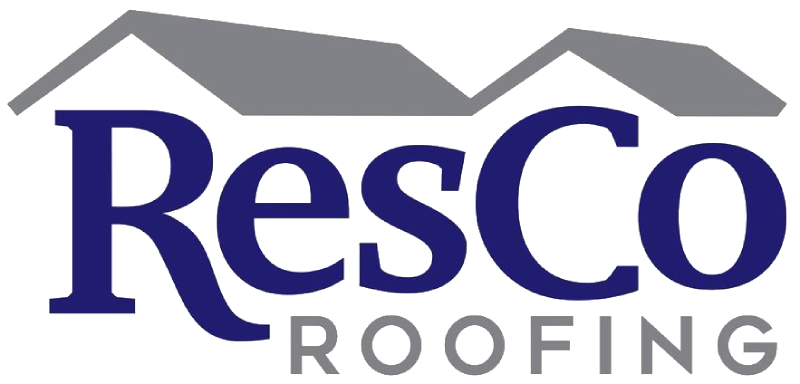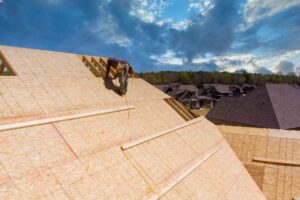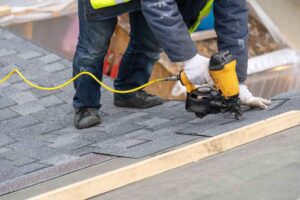Choosing the Right Roofing Company Near Me: A Comprehensive Guide
Your roof is one of the most significant investments you’ll make in your home. It’s the literal shield against the elements, and its integrity is critical to your property’s security and structural soundness. Whether you need a repair, regular maintenance, or a full replacement, the company you choose will play a pivotal role in safeguarding your home.
But with a myriad of options available, how do you discern the best from the rest? In this comprehensive guide, we don the hat of an informed homeowner and walk you through the intricate process of selecting the right roofing company near me.
The Importance of a Sturdy and Reliable Roof
Having a sturdy and reliable roof is crucial for any home or building. It serves as the first line of defense against the elements, safeguarding occupants and belongings from harsh weather conditions. Additionally, a well-constructed roof plays a vital role in enhancing the overall energy efficiency of a structure by providing insulation and reducing heat loss or gain.
A properly maintained roof acts as a protective shield, shielding the interior from rain, snow, ice, and sun exposure. By preventing water damage, mold growth, and extreme temperature fluctuations, it ensures a safe and comfortable living environment. Moreover, a robust roof not only offers functional benefits but also adds aesthetic value to your property, enhancing its curb appeal and overall market worth.
Therefore, investing in professional installation and regular maintenance of your roof is essential for long-term security, comfort, and property value. By prioritizing the integrity of your roof, you are ensuring a durable and reliable shelter that contributes to your well-being and peace of mind.

Factors to Consider in Choosing the Right Roofing Company
When selecting the right roofing company for your needs, several crucial factors come into play. These considerations will guide you in making an informed decision, ensuring that you entrust your roofing project to a reputable, capable, and professional service provider.
- Licensing and Insurance: A legitimate roofing company should hold the necessary licenses for operating in your area, showing compliance with local regulations and standards. Additionally, ensuring that the company has both liability and worker’s compensation insurance protects you from potential liabilities in case of accidents during the project.
- Experience and Reputation: The company’s experience in the roofing industry and its reputation among past clients are significant indicators of reliability and quality workmanship. Look for companies with a solid track record and positive reviews, and consider how long they have been in business as a testament to their expertise and customer satisfaction.
- Warranties and Guarantees: Understanding the warranties and guarantees offered by a roofing company is vital. These commitments not only indicate confidence in the quality of their work but also provide you with protection and peace of mind in the long run.
- Local Expertise: Choosing a locally established company can be advantageous. Local contractors are more likely to be familiar with regional weather challenges and building codes, ensuring that your roofing project complies with local standards and is designed to withstand specific environmental conditions.
- Price and Payment Terms: While cost should not be the sole deciding factor, receiving detailed, transparent quotes and understanding the payment terms is important. Be wary of significantly low bids as they may indicate subpar materials or workmanship. A reputable roof company will provide clear pricing structures and flexible, understandable payment options.
- Communication: Effective communication throughout the duration of your roofing project is essential. A reliable roofing company will keep you informed, answer your questions promptly, and be accessible when you need them. This level of engagement demonstrates their commitment to customer service and the success of your project.
By carefully evaluating these factors, you can ensure that you choose a roofing company that not only meets but exceeds your expectations, providing a reliable, high-quality solution for your roofing needs.
Understanding the Different Types of Roofing Materials
Choosing the right material for your roof is as crucial as selecting the best roofing company. Various materials offer different levels of durability, energy efficiency, aesthetic appeal, and cost, which can significantly impact your long-term satisfaction with your roofing project. Here’s a brief overview of some of the most commonly used roofing materials:
- Asphalt Shingles: One of the most popular choices due to their cost-effectiveness, ease of installation, and versatility. They come in a variety of colors and styles and are suitable for most residential homes. Asphalt shingles have a relatively moderate lifespan but can offer solid protection against various weather conditions.
- Metal Roofing: Known for its durability and longevity, metal roofing is resistant to extreme weather conditions and can significantly increase a home’s energy efficiency by reflecting solar heat. It comes in sheets or tiles and can mimic the look of traditional shingles or clay tiles. Metal roofing is an excellent long-term investment, lasting up to 50 years or more.
- Clay and Concrete Tiles: These materials are highly durable and offer a unique, elegant aesthetic that’s particularly popular in Mediterranean, Spanish, or Southwestern style homes. Both clay and concrete tiles are excellent for hot climates due to their ability to withstand high temperatures and reflect rather than absorb heat.
- Slate Roofing: Slate offers a natural appearance and is one of the most durable roofing materials available, with some slate roofs lasting over 100 years. It’s heavy and requires a sturdy structural support system, but its longevity and resistance to fire, rot, and pests make it a premium choice for homeowners.
- Wood Shingles and Shakes: For those seeking a natural look, wood shingles or shakes provide a rustic aesthetic. They are typically made from cedar, redwood, or pine and can offer good insulation. However, wood roofing requires regular maintenance to prevent decay, mold, and pest infestation.
- Synthetic Roofing: This category includes rubber, plastic, and polymer roofing, designed to mimic the appearance of natural materials like wood or slate. Synthetic roofing products are lightweight, durable, and often more affordable and environmentally friendly than their natural counterparts. They also require less maintenance and can offer good resistance to fire and impact.
Each material has its pros and cons, and the right choice will depend on your region’s climate, the architectural style of your home, and your budget. Consulting with a professional roofing company can help you understand which materials are best suited for your specific needs and environment.
Red Flags to Watch Out for When Choosing a Roofing Company
While selecting the right roofing company is crucial for ensuring a successful and durable roofing project, it’s equally important to be aware of red flags that may indicate a less reputable company. Here are some warning signs to keep an eye out for:
- Lack of Proper Licensing and Insurance: Any reputable roofing company should be able to provide proof of the necessary licensing and insurance required by law. If a company hesitates to show these documents or admits to lacking them, it’s a clear indication to steer clear.
- Unusually Low Bids: While everyone wants a good deal, significantly lower bids compared to other roofing companies can signal that the company might use subpar materials or cut corners in their workmanship. It’s often a case of “you get what you pay for.”
- High-Pressure Sales Tactics: Some companies might try to pressure you into making a quick decision, often citing reasons like “one-time offers” or “limited time discounts.” A trustworthy company will give you time to make an informed decision without undue pressure.
- Requesting Full Payment Upfront: It’s standard practice in the roofing industry to require a deposit before work begins. However, if a company asks for the full payment upfront, this can be a red flag. It may indicate financial instability or a lack of intention to complete the project as agreed.
- Vague or Incomplete Contracts: A professional roofing company should provide a detailed contract that outlines the scope of the project, materials to be used, timelines, costs, and payment terms. Beware of companies that offer vague agreements or refuse to put terms in writing.
- Lack of Communication: If a company is not responsive or fails to communicate effectively during the negotiation phase, it’s likely that these communication issues will continue throughout the project. Regular updates and clear communication are essential for a successful roofing project.
- Negative Reviews or Lack of References: Always research a company’s reputation online and ask for references from past clients. A pattern of negative reviews or an unwillingness to provide references may indicate unsatisfied customers and poor service.
Recognizing these red flags can save you from potential headaches and ensure that you choose a roofing company that’s committed to quality work and customer satisfaction.
The Benefits of Hiring a Local Roofing Company
Choosing a local roofing company for your roofing needs comes with several significant advantages. Firstly, local companies have a deep understanding of the area’s specific weather patterns and environmental challenges, allowing them to suggest and select materials that are best suited to withstand local conditions. This knowledge ensures that your roof will be built to last, withstanding the unique demands of your geographic location.
Furthermore, local roofers are invested in their community’s well being and reputation, often going extra lengths to ensure customer satisfaction. This commitment to excellence can lead to higher quality workmanship and more personalized customer service. Responding quickly to issues such as leaks or damage is easier for local companies than it might be for larger, non-local entities, ensuring that your problems are addressed promptly and efficiently.
Hiring locally also supports the local economy, promoting job creation within your community and ensuring your money contributes to the local economic development. Last but not least, local companies are likely to have established relationships with local suppliers, potentially gaining access to better materials at lower costs, savings that can often be passed down to you, the homeowner.
Questions to Ask Before Hiring a Roofing Company
Before committing to a roofing company, it’s essential to ask pointed questions to ensure you’re making an informed decision. Here are crucial inquiries to consider:
- How long have you been in the roofing business? Experience is a significant factor in roofing, as it often correlates with knowledge and quality of work.
- Can you provide local references? Hearing from past clients can give you insight into their satisfaction levels and the company’s reliability.
- Do you have a portfolio of completed projects? Visual evidence of their work can help assess whether their capabilities match your project’s requirements.
- Are you licensed and insured? Confirming their legal and financial protections safeguards you against liability and ensures they meet industry standards.
- What warranties do you offer on materials and labor? Understanding the guarantees involved can give you peace of mind about the longevity and repairs of your roof.
- What is your project timeline and availability? Pinning down a clear schedule helps manage expectations and ensures their timelines align with your needs.
- Can you provide a detailed written estimate? A comprehensive breakdown of costs, including labor, materials, and any potential additional expenses, is essential for budget planning.
These questions can help you gauge the professionalism, reliability, and quality of the roofing company you’re considering, aiding you in making a choice that aligns with your needs and expectations.
How to Compare Quotes and Choose the Best Pricing Option
Comparing quotes from different roofing companies is a crucial step in making sure you get the best value for your money. When you receive multiple quotes, the first thing to do is ensure they are all quoting on the same basis. This includes the scope of work, the quality of materials, and any warranties offered. It’s not just about the bottom line; a lower quote might mean lower quality materials or less comprehensive service.
- Materials: Are the materials of the same quality and brand across the quotes? Higher quality roofing materials might be more expensive but can offer better durability and longevity.
- Labor: Compare the estimated time it will take to complete the project and the rate charged per hour. Be wary of quotes that seem significantly lower, as this could reflect less experienced workers or a rush job.
- Warranties: What warranties are offered on both materials and labor? Longer warranties might come with a higher quote but offer better peace of mind.
- Additional Costs: Look for any additional costs such as permits, disposal fees, or unexpected project expenses. A comprehensive quote that includes these potential costs can provide a more accurate picture of the total price.
Ask each company to explain any significant differences in their quotes. This can help you understand the rationale behind their pricing and assess the value they’re offering. Remember, the cheapest option is not always the best. Consider the company’s reputation, the quality of materials, and the level of service they provide when making your decision.
Ultimately, choosing a roofing company is an investment in your home’s safety and durability, so be sure to choose wisely. By doing your research and asking the right questions, you can find a local roofing company that meets your needs and provides high-quality work for years to come.






